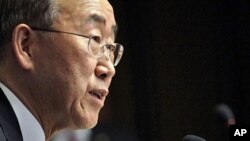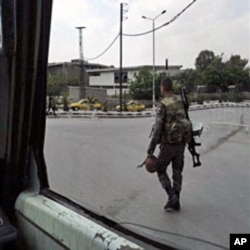U.N. Secretary-General Ban Ki-moon says he spoke to Libyan Prime Minister Baghdadi al-Mahmoudi by telephone Tuesday evening and conveyed his concerns about the need to protect the civilian population.
“I told him that the Libyan authorities must stop attacking civilians. I said there must be an immediate, verifiable cease-fire, negotiations towards a peaceful resolution of the conflict, and unimpeded access for humanitarian workers," explained Ban. "The prime minister agreed to receive my special envoy, Mr. al-Khatib, and I have instructed him to travel to Tripoli as soon as possible again.”
Ban says the prime minister suggested his government is willing to engage in an immediate cease-fire, to be monitored by the United Nations and the African Union. But, first and foremost, the U.N. chief says violence in the besieged city of Misrata must end so humanitarian aid can reach those trapped by the fighting.
Turning to Syria, Ban again urges President Bashar-al-Assad to listen to those who are calling for reform and freedom. He calls upon the Syrian security forces to desist from excessive force and mass arrest of peaceful demonstrators.
Ban says he spoke to Assad about four or five days ago and the Syrian president invited the United Nations’ humanitarian assessment team to enter the country.
“I am disappointed that the United Nations humanitarian assessment team has not been granted access yet to Deraa and other places," said Ban. "We continue to press the Syrian authorities to grant access for the United Nations to be able to do an independent and impartial assessment of the situation in Deraa and other cities affected by the recent violence, and to plan a response and necessary humanitarian assistance.”
The secretary-general says he will continue to press the Syrian authorities to allow the U.N. humanitarian assessment teams to visit areas of conflict to determine the critical needs of the civilian population.
On the political side, he urges the Syrian president to engage in a dialogue with his people and to take bold and decisive measures before it is too late.














